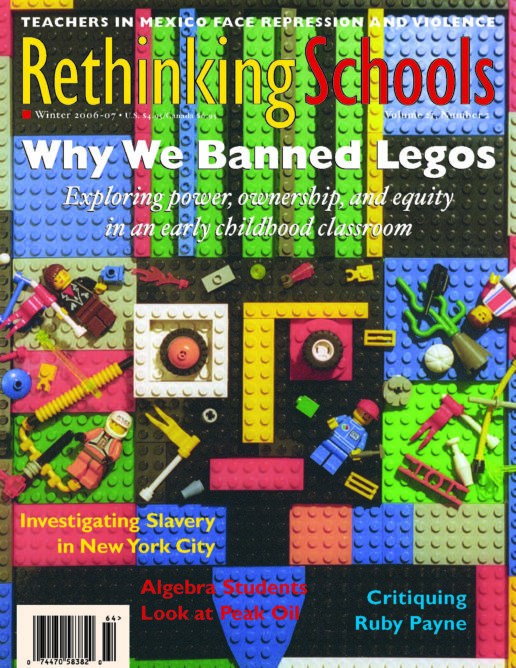Good Stuff 21.2
Reading Doesn’t Matter Anymore: Shattering the Myths of Literacy
By David Booth
(Stenhouse, 2006)
176 pp. $15.00
Poetry Everywhere: Teaching Poetry Writing in School and in the Community
By Jack Collom and Sheryl Noethe
(Teachers and Writers Collaborative, 2005)
252 pp. $19.95
The Adventures of Dr. Alphabet
By David Morice
(Teachers and Writers Collaborative, 1995)
276 pp. $15.95
How dare someone title a book Reading Doesn’t Matter Anymore during the era of No Child Left Behind? David Booth, a professor emeritus at the Ontario Institute for Studies in Education, has written a book that challenges rigid and mechanical teaching of reading. But it’s not a grim book. It is full of delightful personal anecdotes and suggestions for teaching where he places the meaning and feel of texts at the center of his analysis. In the beginning of the book he says:
I’m sitting beside my 5-year-old nephew,… reading a novel and watching him pretend to read one, seeing him turn a page every time I do, following my lead. What a natural way to enter reading!… This is a metaphor for how we learn to read; as apprentice, we sit aside a master reader, and listen and watch as the sound of the reader’s voice turns the printed code into meaning that makes us laugh or wonder or question or know.
Books can also make us cry, think, long for newness in our lives, and dream. The story is at the heart of literacy; content is the motivating factor. Booth says, “Philosopher Maxine Greene teaches us to allow texts into our lives, to respond from experience, then listen to others responding…. How are we ever going to participate fully in society if we don’t share our views? To have a single view from a teacher, taken from a manual, gives little opportunity for the individual to consider other possibilities.”
Reading aloud in the classroom, encouraging students to talk about the texts, and helping them learn to write new texts are the essence of learning to read in a complex and compassionate way.
As a supplement to Booth’s book, I recommend two books, published by the Teachers and Writers Collaborative, which provide hundreds of ideas to help teachers build up a repertoire of writing challenges that can supplement a reading program centered on the meaning of the text and students’ articulation of their own understandings and feelings about what they read.
Poetry Everywhere contains 65 writing exercises that will work for students of all ages and skill levels. It also includes more than 400 poems written by beginning students and practiced poets as well as 11 essays on subjects as varied as: “On Teaching Students of Different Ages,” “On Sound and Rhythm,” “On Collaborations,” “Two Looks at Re-vision,” and “On Follow-up.”
Many of the exercises in The Adventures of Dr. Alphabet involve physical activity, painting and drawing, and the use of objects that provoke thought, tease out ideas, and elicit stories.
These three books get to the heart of the question “Why read?” Many teachers feel they cannot step out of the boundaries created by mandated, “teacher proof” programs. But I suggest, for the sake of the children, that we subvert these rigid programs. The need to develop children’s intelligence and creativity is a professional obligation. It might be risky, but is central to caring, decent teaching. These books can help re-humanize education.

